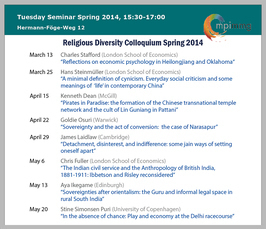"Anthropology and Government in British India, 1881-1911: Ibbetson and Risley Reconsidered"
Religious Diversity Colloquium Spring 2014
- Date: May 6, 2014
- Time: 03:30 PM - 05:00 PM (Local Time Germany)
- Speaker: Chris Fuller (London School of Economics)
- Professor Chris Fuller specialises in India. His first fieldwork (1971-2) was in Kerala in southwest India among the Nayars and the Syrian Christians, and his work particularly focused on kinship among the Nayars, famous for their matriliny. From 2003-5, with other colleagues in LSE, Fuller worked on a major research project, sponsored by ESRC, on regionalism, nationalism and globalisation in India, and his research has focused on middle-class company managers and software professionals in the city of Chennai (Madras). From 2005-8, with Haripriya Narasimhan, he carried out an ESRC-sponsored research project on a group of Tamil Brahmans, focusing on this traditional elite‘s modern transformation into a migratory, urbanised, trans-national community. Their book based on this research, Tamil Brahmans: The Making of a Middle-Class Caste, will be published in 2014 by the University of Chicago Press and Social Science Press (New Delhi). Fuller has also researched and written extensively on popular Hinduism and Hindu nationalism, the caste system, the anthropology of the state and other topics. His current research is on the history of the anthropology of India.
- Location: MPI-MMG, Hermann-Föge-Weg 12, Göttingen
- Room: Conference Room

For more details please contact vdvoffice(at)mmg.mpg.de.
In the literature on colonial knowledge in British India, the connection between ethnography and the ‘colonial state’ has been discussed at a highly generalised level, so that individual political actors are mostly absent in it. Denzil Ibbetson (1847-1908) and Herbert Risley (1851-1911) were both leading anthropologists and high-ranking officials in the government of India. As individual case studies of the relationship between colonial knowledge and colonial rule, this paper examines both their anthropological scholarship and their work in policy making.
Ibbetson’s Karnal settlement report and 1881 Punjab census report were pioneering ethnographic publications. The census report also set out his occupational theory, which defined castes as hereditary occupational groups, and explained the caste system’s development in relation to the evolution of the division of labour. Risley’s handbook of tribes and castes in Bengal, his 1901 India census report, and his book, The people of India, argued that the caste system originated in racial distinctions, that status hierarchy is its key feature, and that caste rank is correlated with racial type. Risley’s racial theory has been discredited, but his concern with hierarchy strongly influenced the subsequent anthropology of caste.
Curzon was Viceroy of India from 1899 to 1905 and Minto from 1905 to 1909. As a senior government official, Ibbetson strongly supported legislation to prevent the transfer of land from peasants to moneylenders in Punjab, which Curzon’s government passed in 1900. Curzon’s most controversial decision was the partition of Bengal, completed in 1905. In 1902, Ibbetson became the Home member of the Viceroy’s executive Council and Risley became Secretary of the Home department, responsible for drafting documents about partition, which both men supported. During Minto’s viceroyalty, legislative reforms (Morley-Minto reforms), which Ibbetson opposed, were enacted in 1909; Risley, as Secretary, was mainly responsible for their preparation and he supported them. Examination of the evidence about Punjab land policy, the partition of Bengal, and the Morley-Minto reforms shows that Ibbetson advocated policies shaped by his anthropological understanding of ‘traditional’ society, and his perception of the agrarian classes’ importance, but not by his theory of caste. In Risley’s bureaucratic work, the impact of his anthropological scholarship was more mixed, but it is notable that his theory of caste had no significant role, while his arguments in support of Muslim interests were inconsistent with ethnographic evidence. Hence the imperial government’s policy making was not in practice consistently shaped by an ‘ethnographic’ understanding of Indian society, as modern scholarship on colonial knowledge has argued.